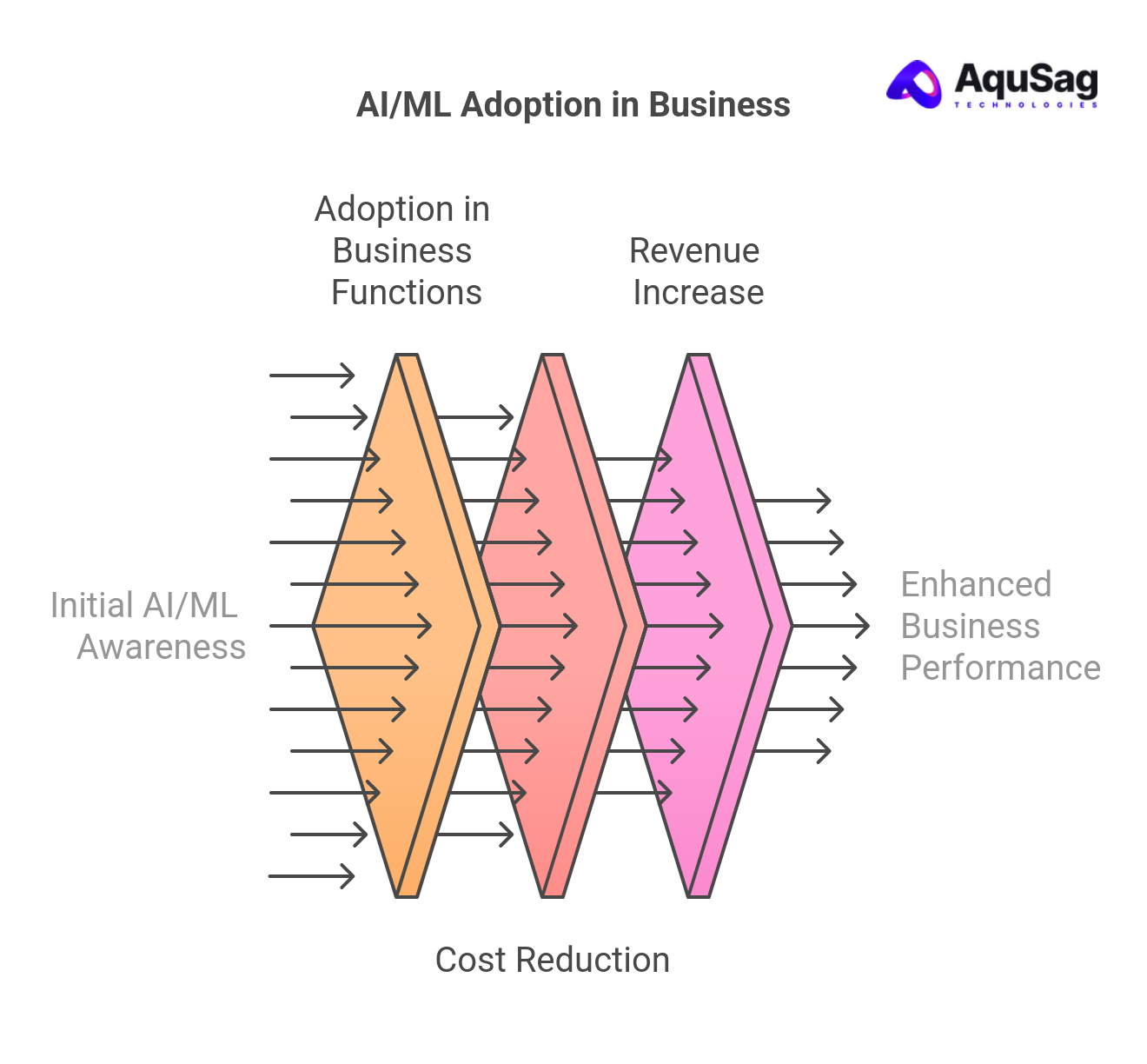 In an era defined by rapid digital evolution, Artificial Intelligence (AI) and Machine Learning (ML) are no longer experimental technologies—they are critical engines of transformation across industries. From predictive diagnostics in healthcare to dynamic route optimization in logistics, businesses are embracing AI/ML to sharpen their competitive edge, streamline operations, and unlock unprecedented value. According to a 2023 McKinsey report, 50% of businesses have already adopted AI in at least one business function, with leading adopters seeing cost reductions of up to 20% and revenue increases of 10% or more.
In an era defined by rapid digital evolution, Artificial Intelligence (AI) and Machine Learning (ML) are no longer experimental technologies—they are critical engines of transformation across industries. From predictive diagnostics in healthcare to dynamic route optimization in logistics, businesses are embracing AI/ML to sharpen their competitive edge, streamline operations, and unlock unprecedented value. According to a 2023 McKinsey report, 50% of businesses have already adopted AI in at least one business function, with leading adopters seeing cost reductions of up to 20% and revenue increases of 10% or more.
As enterprises in sectors like healthcare, software, logistics, eClinical, blockchain, AI/ML development, and manufacturing seek to scale or outsource innovation, understanding how AI and ML transform core processes becomes essential. This blog explores the revolutionary potential of AI/ML technologies, industry-specific use cases, and how organizations can practically adopt them through expert consulting and dedicated development teams.
The Business Imperative for AI and ML Adoption
AI and ML are no longer seen as future-facing investments—they are urgent business imperatives. Decision-makers like CTOs, Chief Innovation Officers, and Product Leaders recognize that integrating intelligent systems can yield immediate ROI in:
- Operational efficiency
- Cost optimization
- Customer experience
- Strategic forecasting
- Innovation acceleration
A 2024 Deloitte survey found that companies with high AI maturity outperform their peers by 30% in productivity and innovation metrics. Enterprises that delay AI integration risk falling behind more agile, tech-driven competitors.
Intelligent Automation: The Foundation of Smart Operations
At the heart of the AI/ML revolution is intelligent automation, the merging of AI with robotic process automation (RPA) to automate rule-based, repetitive tasks at scale. Businesses in healthcare and logistics, in particular, have seen measurable benefits:
- Healthcare: AI-driven bots automate patient onboarding, insurance verification, and medical record summarization, cutting admin costs by up to 40% (Source: HIMSS 2023).
- Logistics: AI-integrated RPA platforms streamline invoice processing, customs documentation, and shipment tracking in real-time.
Featured Blog Post: Smart Factories: The Future of Manufacturing is Digital
By reducing human effort on mundane tasks, organizations free up skilled resources to focus on higher-order innovation.
Data-Driven Decision-Making with Predictive and Prescriptive Analytics
AI/ML systems thrive on data. By leveraging large volumes of structured and unstructured data, businesses can move from reactive to predictive and prescriptive decision-making:
- Manufacturing: Predictive maintenance powered by ML models helps identify equipment failure risks, reducing unplanned downtime by 30–50%.
- eClinical Trials: AI accelerates patient recruitment and protocol design through intelligent patient matching, improving trial efficiency by 25%.
- Software Development: ML-based analytics forecast project risks, backlog issues, or performance bottlenecks, enabling preemptive action.
Prescriptive models go a step further by recommending optimal actions based on predictive insights, empowering leaders to make informed, proactive decisions.
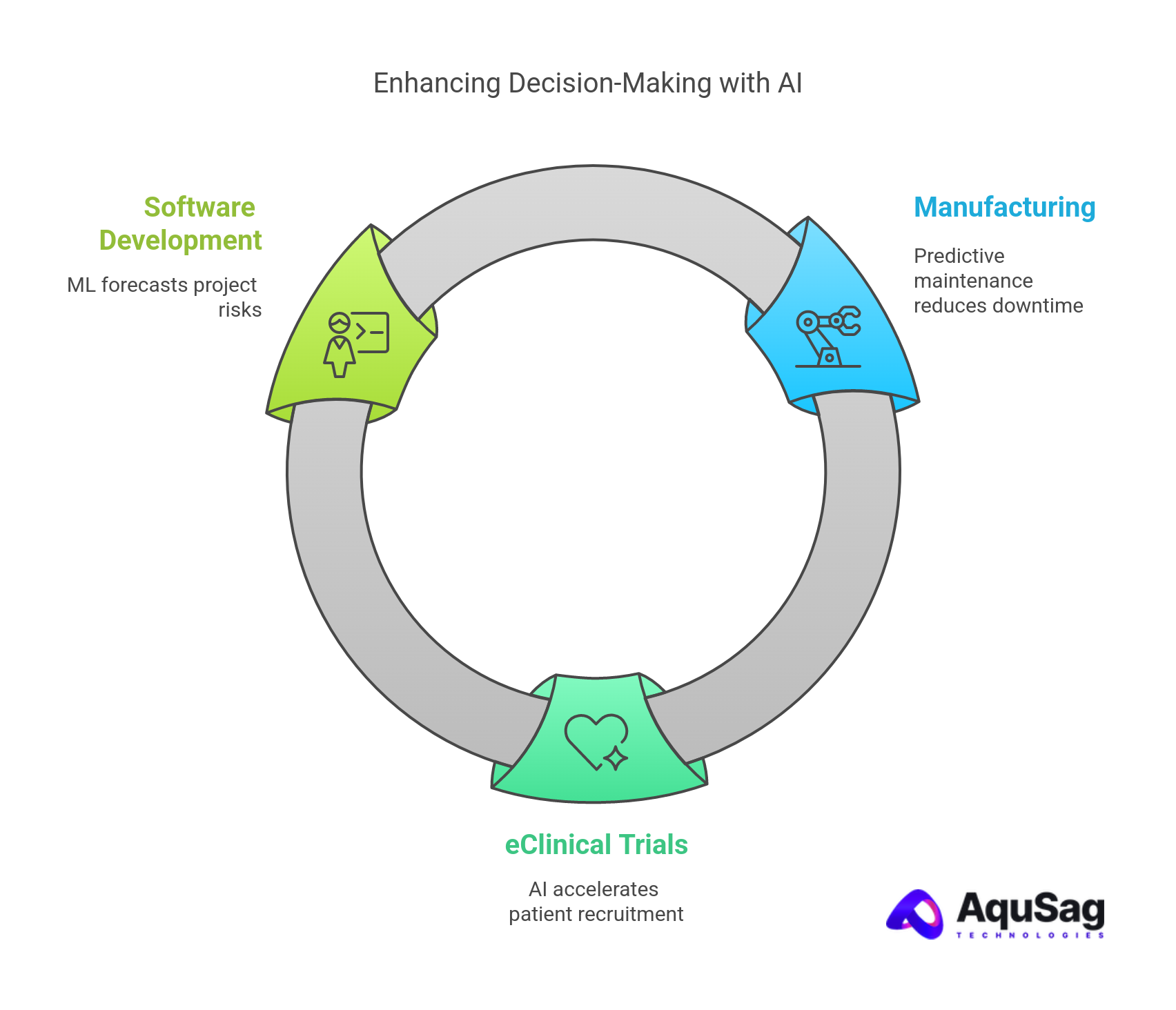 Hyper-Personalization: AI-Powered Customer Experience
Hyper-Personalization: AI-Powered Customer Experience
The digital customer now expects not just service, but personalized experiences at scale. AI/ML technologies enable hyper-personalization across industries:
- Healthcare: AI tailors treatment recommendations based on genetic, historical, and behavioral data.
- Enterprise Tech: Chatbots and virtual assistants offer contextual support based on user history and preferences.
- Blockchain Platforms: ML helps in personalizing investment strategies or crypto portfolio suggestions by analyzing user behaviors and market trends.
According to Salesforce (2023), 88% of customers say experience is as important as products or services, making AI-driven personalization a strategic necessity.
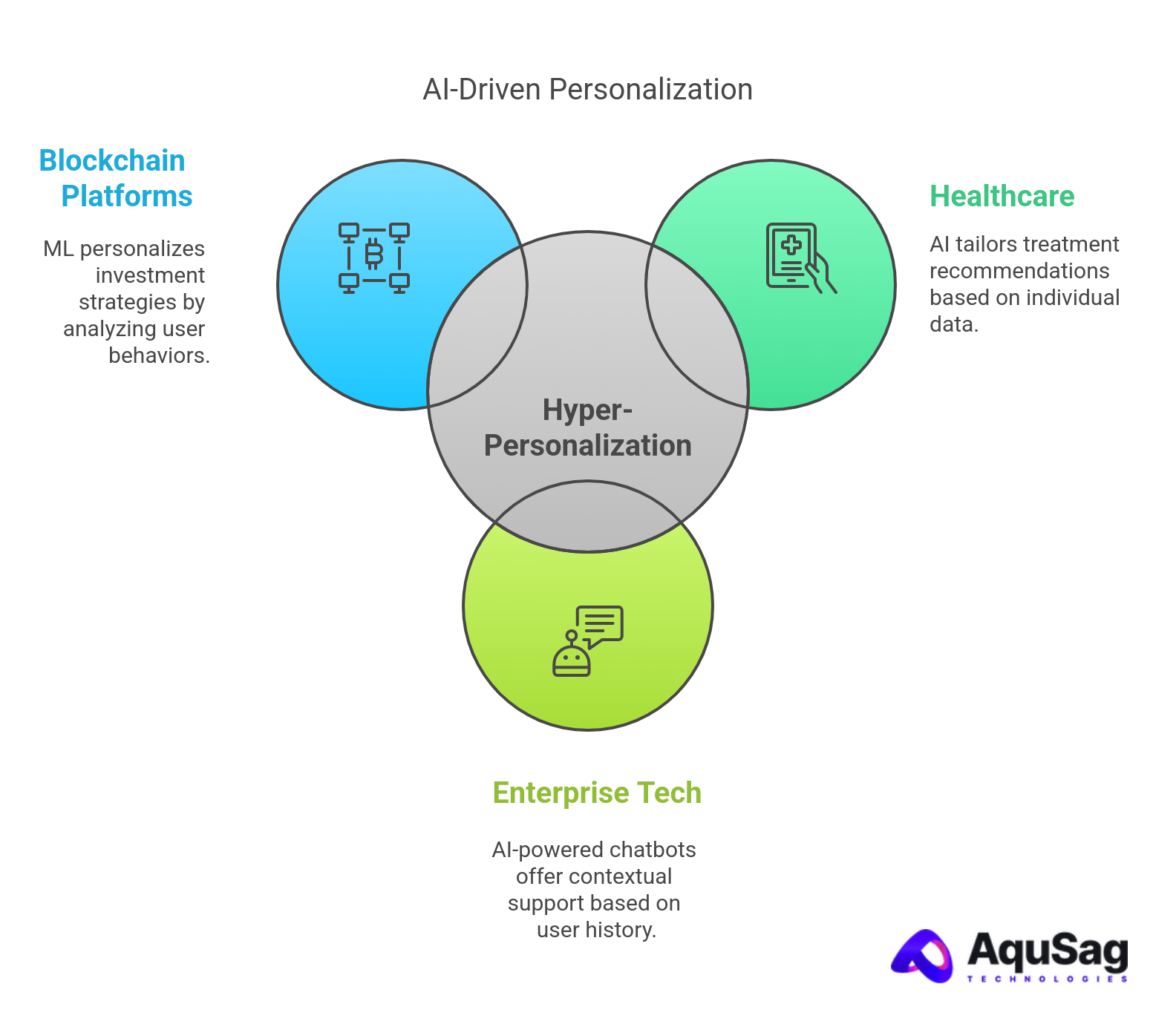 Real-Time Process Optimization: Adaptive AI in Action
Real-Time Process Optimization: Adaptive AI in Action
In logistics and manufacturing, adaptive AI systems continuously learn and adjust to changes in real time:
- Logistics: ML-powered route optimization platforms like those used by DHL and FedEx dynamically adjust delivery routes based on traffic, weather, and priority, reducing delivery times by 20%.
- Smart Factories: Digital twins and AI-driven sensors optimize energy usage, machine configurations, and throughput in real time.
These technologies enable businesses to operate with agility, even in volatile environments—a key differentiator in today’s global supply chains.
Featured Blog Post: The Rise of Fintech: How AI and Blockchain are Shaping Financial Services
Industry-Specific Use Cases of AI/ML in Action
Healthcare
- AI-powered diagnostics detect anomalies in imaging scans with over 90% accuracy.
- Natural Language Processing (NLP) extracts meaningful data from unstructured clinical notes.
Software and Product Development
- AI-assisted coding tools suggest code completions, flag bugs, and improve team productivity by up to 30%.
- ML models analyze user behavior to drive UX improvements.
Logistics
- Autonomous vehicles and drone delivery systems use computer vision and ML for navigation.
- Inventory demand forecasting powered by AI ensures stock availability without overstocking.
Manufacturing
- AI vision systems detect defects in products with high precision.
- ML-based supply chain models adjust procurement strategies based on macroeconomic trends.
Blockchain & Enterprise Tech
- Smart contract validation using ML ensures compliance and error reduction.
- AI-led fraud detection flags anomalous transaction patterns in real time.
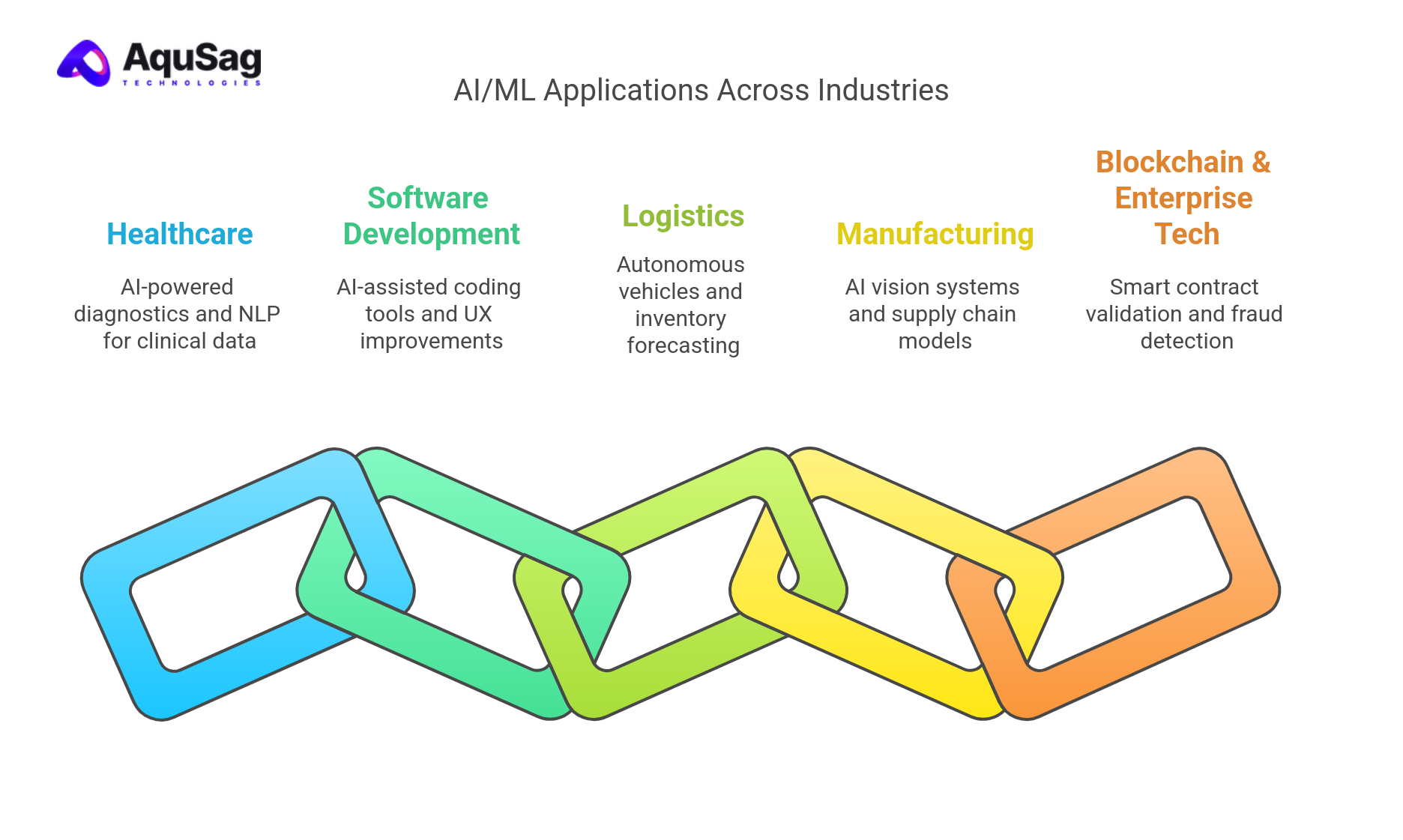 Responsible AI: Ethics, Transparency, and Regulation
Responsible AI: Ethics, Transparency, and Regulation
With power comes responsibility. As businesses accelerate AI adoption, ethical concerns around bias, transparency, and accountability grow.
The EU AI Act and the U.S. AI Bill of Rights (2023) mandate guidelines on fairness, explainability, and human oversight. Businesses need to ensure:
- Fair data representation
- Transparent AI decision-making pipelines
- Regular model auditing and retraining
Partnering with AI consulting firms like AquSag ensures responsible AI development aligned with global compliance standards.
Building Future-Ready AI Systems with AquSag
AquSag Technologies helps future-focused businesses design and scale AI/ML initiatives with confidence. Our proven expertise spans:
- Dedicated AI/ML development teams tailored to your domain
- Custom model design for classification, prediction, recommendation, and NLP
- Data strategy consulting for structuring and labeling high-quality datasets
- Deployment & MLOps support for production-grade AI systems
Whether you're optimizing clinical workflows, reimagining logistics operations, or building next-gen enterprise products, AquSag accelerates your journey from vision to value.
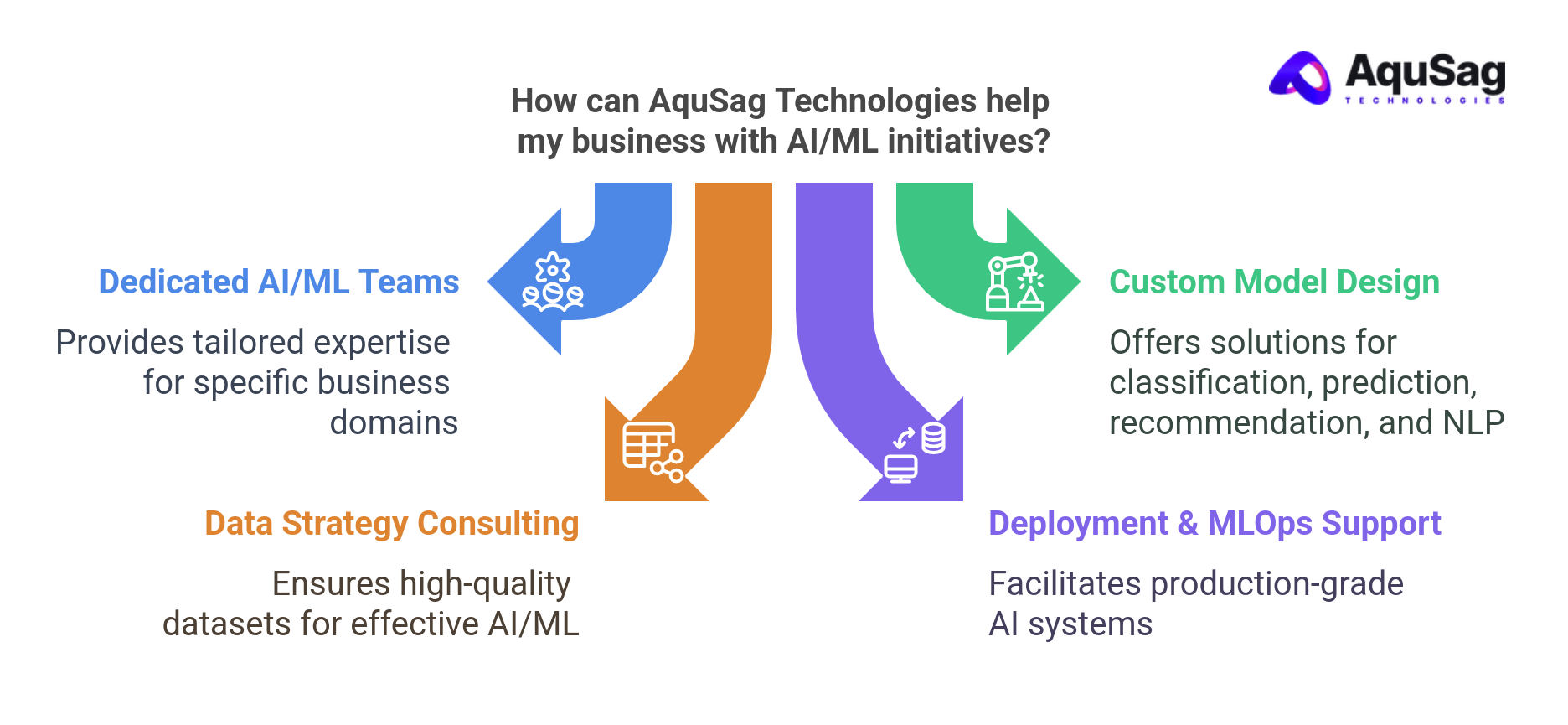 Conclusion: Embrace the Intelligent Future
Conclusion: Embrace the Intelligent Future
The integration of AI and ML into core business processes is not just a trend—it's the new normal. As industries evolve, businesses that harness AI for operational excellence, innovation, and strategic foresight will lead the charge into a smarter, more adaptive future.
With a partner like AquSag Technologies, organizations gain access to not just technology, but the strategic vision, domain expertise, and scalable teams needed to drive transformation.
Ready to future-proof your business?
Contact AquSag Technologies today to explore how our AI/ML consulting and development services can help you innovate, scale, and lead in your industry.